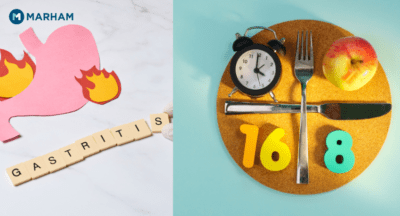Intermittent fasting has received recognition as a nutritional technique for weight loss, progressed metabolism, and general health. However, issues have been raised approximately from its potential impact on digestive health, especially in relation to gastritis.
While there are limited clinical studies mainly addressing the direct relationship between intermittent fasting and gastritis, it is essential to understand the factors that may influence gastritis signs through fasting periods.
Consult a nutritionist right now if you need a proper diet plan for intermittent fasting to avoid gastritis.
Understanding Gastritis
Gastritis is a circumstance characterized by inflammation of the stomach lining, which can lead to numerous digestive symptoms. It may be caused by factors such as infections, excessive alcohol consumption, certain medicines, or autoimmune problems.
Common signs and symptoms consist of abdominal pain, indigestion, bloating, and nausea. Diagnosis entails clinical assessment and may consist of tests like endoscopy or blood tests.
Treatment alternatives range from life modifications to medicinal drugs, depending on the underlying purpose and severity of the gastritis.
Exploring Intermittent Fasting
Intermittent fasting is a dietary technique that includes alternating between durations of fasting and consuming. It has received popularity for its benefits together with weight loss, progressed insulin sensitivity, and more suitable cellular growth.
Different strategies of intermittent fasting exist, inclusive of the 16/8 method, change-day fasting, and the 5:2 eating regimen. During fasting periods, individuals normally abstain from consuming calories, but may additionally nonetheless have non-caloric fluids like water or tea.
It is important to word that intermittent fasting may not be appropriate for all of us and personal reviews can vary.
The Relationship Between Intermittent Fasting and Gastritis
The direct relationship between intermittent fasting and gastritis is not well-established due to limited scientific research. Factors associated with intermittent fasting that may affect gastritis symptoms include:
- Increased stomach acid production during fasting periods, which can contribute to stomach lining irritation.
- Skipping meals or consuming large meals after fasting, can trigger symptoms like abdominal pain and bloating.
- Consumption of caffeinated beverages or acidic meals during eating periods may aggravate the stomach lining.
The impact of intermittent fasting on gastritis can vary amongst individuals, with a few experiencing symptom improvement and others experiencing elevated pain.
It is recommended that people with gastritis seek advice from a healthcare professional for customized recommendations on whether or not intermittent fasting is appropriate for them. Alternative nutritional techniques may be recommended to effectively control gastritis signs and symptoms.
You may read also – How to prevent acidity in Intermittent Fasting?
Individual Variations and Considerations
- Responses to intermittent fasting can vary among individuals with gastritis.
- Gastritis severity and underlying causes can influence the response to intermittent fasting.
- Consultation with a healthcare professional is crucial for personalized guidance.
- Consider shorter fasting windows or modified fasting methods for individuals with gastritis.
- Prioritize nutrient-rich foods during eating periods to protect the stomach lining.
- Monitor symptoms and keep a food diary to understand the impact of intermittent fasting.
- Consider stress management and lifestyle factors in addition to diet.
- Seek guidance from a registered dietitian or gastroenterologist specializing in digestive disorders.
Tips to Prevent Gastritis during Intermittent Fasting
To prevent gastritis symptoms during intermittent fasting, consider the following tips:
- Opt for shorter fasting windows: Consider shorter fasting periods or modified fasting methods to minimize the potential impact on stomach acid production and gastric irritation.
- Eat smaller, balanced meals: Instead of consuming large meals after fasting, opt for smaller, frequent meals during your eating window. This can help prevent excessive stretching of the stomach and reduce the risk of triggering gastritis symptoms.
- Choose gentle foods: Prioritize nutrient-rich, non-acidic ingredients that are much less possibly to annoy the belly lining. Include lean proteins, complete grains, fruits, greens, and healthy fat in your food.
- Avoid caffeine and acidic meals: Steer clear of caffeinated drinks, citrus end results, tomatoes, highly spiced foods, and different acidic or irritant materials which can get worse gastritis signs.
- Stay hydrated: Drink plenty of water throughout the day to support digestion and maintain optimal hydration.
- Manage stress levels: High stress can exacerbate gastritis symptoms. Incorporate stress management techniques such as meditation, deep breathing exercises, or engaging in relaxing activities to minimize stress during fasting periods.
- Monitor your symptoms: Keep a food diary to track your meals and fasting periods, as well as any associated symptoms. This can help identify trigger foods or patterns that may worsen gastritis symptoms.
- Take medications as prescribed: If you are on medication for gastritis or any other related condition, ensure you take them as prescribed by your healthcare professional. Follow their instructions regarding timing and dosage during fasting and eating periods.
- Consult a healthcare professional: Seek guidance from a healthcare professional, such as a registered dietitian or gastroenterologist, who can provide personalized advice based on your specific condition and needs.
Takeaway
It is important to approach intermittent fasting with caution if you have gastritis. Individual variations and considerations, such as consulting with a healthcare professional, monitoring symptoms, and making personalized modifications, are essential for managing gastritis effectively.
Prioritizing your digestive health and seeking a nutritionist’s guidance will help you make informed decisions about incorporating intermittent fasting into your gastritis management plan.

